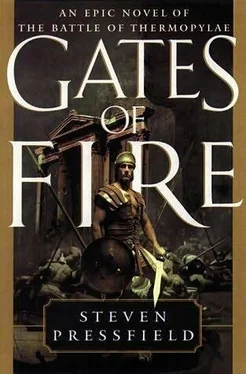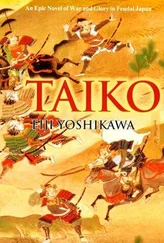Steven Pressfield - Gates of Fire - An Epic Novel of the Battle of Thermopylae
Здесь есть возможность читать онлайн «Steven Pressfield - Gates of Fire - An Epic Novel of the Battle of Thermopylae» весь текст электронной книги совершенно бесплатно (целиком полную версию без сокращений). В некоторых случаях можно слушать аудио, скачать через торрент в формате fb2 и присутствует краткое содержание. Жанр: Историческая проза, на английском языке. Описание произведения, (предисловие) а так же отзывы посетителей доступны на портале библиотеки ЛибКат.
- Название:Gates of Fire: An Epic Novel of the Battle of Thermopylae
- Автор:
- Жанр:
- Год:неизвестен
- ISBN:нет данных
- Рейтинг книги:3 / 5. Голосов: 1
-
Избранное:Добавить в избранное
- Отзывы:
-
Ваша оценка:
- 60
- 1
- 2
- 3
- 4
- 5
Gates of Fire: An Epic Novel of the Battle of Thermopylae: краткое содержание, описание и аннотация
Предлагаем к чтению аннотацию, описание, краткое содержание или предисловие (зависит от того, что написал сам автор книги «Gates of Fire: An Epic Novel of the Battle of Thermopylae»). Если вы не нашли необходимую информацию о книге — напишите в комментариях, мы постараемся отыскать её.
Gates of Fire: An Epic Novel of the Battle of Thermopylae — читать онлайн бесплатно полную книгу (весь текст) целиком
Ниже представлен текст книги, разбитый по страницам. Система сохранения места последней прочитанной страницы, позволяет с удобством читать онлайн бесплатно книгу «Gates of Fire: An Epic Novel of the Battle of Thermopylae», без необходимости каждый раз заново искать на чём Вы остановились. Поставьте закладку, и сможете в любой момент перейти на страницу, на которой закончили чтение.
Интервал:
Закладка:
Bodies lay in the road. Mostly men, but women and children too, with the same dark blot of fluid sinking into the pitiless dirt. The living trod past them, grief-riven. Everyone was filthy. Many had no shoes. All were fleeing the slave columns and the roundup which would be starting soon.
Women carried infants, some of them already dead, while other dazed figures glided past like shades, bearing away some pitifully useless possession, a lamp or a volume of verse. In peacetime the wives of the city walked abroad with necklaces, anklets, rings; now one saw none, or it was secreted somewhere to pay a ferryman's toll or purchase a heel of stale bread. We encountered people we knew and didn't recognize them. They didn't recognize us. Numb reunions were held along roadsides or in copses, and news was traded of the dead and the soon to be dead.
Most piteous of all were the animals. I saw a dog on tire that first morning and ran to snuff his smoking fur with my cloak. He fled, of course; I couldn't catch him, and Diomache snatched me back with a curse for my foolishness. That dog was the first of many. Horses hamstrung by sword blades, lying on their flanks with their eyes pools of numb horror. Mules with entrails spilling; oxen with javelins in their sides, lowing pitifully yet too terrified to let anyone near to help. These were the most heartbreaking: the poor dumb beasts whose torment was made more pitiful by their lack of faculty to understand it.
Feast day had come for crows and ravens. They went for the eyes first. They peck a man's asshole out, though God only knows why. People chased them off at first, rushing indignantly at the blandly feeding scavengers, who would retreat as far only as necessity dictated, then hop back to the banquet when the coast was clear. Piety demanded that we bury our fallen countrymen, but fear of enemy cavalry pushed us on. Sometimes bodies would be dragged into a ditch and a few pitiful handfuls of dirt cast over them, accompanied by a miserable prayer. The crows got so fat they could barely fly a foot off the ground.
We did not go into the city, Diomache and I.
We had been betrayed from within, she instructed me, speaking slowly as one would to a simpleton, to make sure I understood. Sold out by our own citizens, some faction seeking power, then they themselves had been double-crossed by the Argives. Astakos was a port, a poor one, but a western harbor nonetheless, which Argos had long coveted. Now she had it.
We found Bruxieus on the morn of the second day. His slave brand had saved him. That, and his blindness, which the conquerors mocked even as he cursed and swung at them with his staff.
You're free, old man! Free to starve or beg from his belly's necessity for the victor's yoke.
The rain came that evening. This, too, seems a constant coda to slaughter. What had been ash was now gray mud, and the stripped bodies which had not been reclaimed by sons and mothers now glistened a ghastly white, cleansed by the gods in their remorseless way.
Our city no longer existed. Not alone the physical site, the citizens, the walls and farms. But the very spirit of our nation, the polis itself, that ideal of mind called Astakos that, yes, had been smaller than a deme of Athens or Corinth or Thebes, that, yes, had been poorer than Megara or Epidauros or Olympia, but that existed as a city nonetheless. Our city, my city. Now it was effaced utterly. We who called ourselves Astakiots were effaced with it. Without a city, who were we? What were we?
A dislocation of the faculties seemed to unman all. No one could think. A numb shock possessed our hearts. Life had become like a play, a tragedy one had seen enacted on the stage-the fall of Ilium, the sack of Thebes. Only now it was real, performed by actors of flesh and blood, and those actors were ourselves.
East of the Field of Ares, where the fallen in battle were buried, we came upon a man digging a grave for an infant. The baby, wrapped in the man's cloak, lay like a grocer's bundle at the edge of the pit. He asked me to hand it down to him. He was afraid the wolves would get it, he said, that's why he had dug the hole so deep. He didn't know the child's name. A woman had handed it to him during the flight from the city. He had carried the babe for two days; on the third morning it died. Bruxieus wouldn't let me hand the little body down; it was bad luck, he said, for a living young spirit to handle a dead one. He did it himself. We recognized the man now. He was a mathematikos, a tutor of arithmetic and geometry, from the city. His wife and daughter emerged from the woods; we realized they had been hiding till they knew we brought no harm. They had all lost their minds. Bruxieus had instructed Diomache and me in the signs. Madness was contagious, we must not linger.
We needed Spartans, the teacher declared, speaking softly behind his sad watery eyes. Just fifty would have saved the city. Bruxieus was nudging us to go.
See how numb we are? the man continued. We glide about in a daze, disconnected from our reason. You'll never see Spartans in such a state. This-he gestured to the blackened landscape -is their element. They move through these horrors with clear eyes and unshaken limbs. And they hate the Argives. They are their bitterest enemies.
Bruxieus pulled us away.
Fifty of them! the man still shouted, while his wife struggled to tug him back to the safety of the trees. Five! One would have saved us!
We recovered Diomache's mother's body, and my mother's and father's, on the eve of the third day. A squad of Argive infantry had set up camp around the gutted ruins of our farmhouse.
Already surveyors and claims markers had arrived from the conquering cities. We watched, hidden, from the woods as the officials marked off the parcels with their measuring rods and scrawled upon the white wall of my mother's kitchen garden a sign of the clan of Argos whose lands ours would now become.
An Argive taking a piss spotted us. We took to flight but he called after us. Something in his voice convinced us that he and the others intended no harm. They had had enough of blood for now. They waved us in, gave us the bodies. I sponged the mud and blood off my mother's corpse, using the singlet she had made for me, for my promised passage to Ithaka. Her flesh was like cold wax. I did not weep, neither shrouding her form in the burial robe she had woven with her own hands and which in its cupboard chest remained miraculously unstolen, nor interring her bones and my father's beneath the stone that bore our ancestors' blazon and sigma.
It was my place to know the rites, but I had not been taught them, awaiting my initiation to the tribe when I turned twelve. Diomache lit the flame, and the Argives sang the paean, the only sacred song any of them knew.
Zeus Savior, spare us Who march into your fire Grant us courage to stand ShieU'to-shieU with our brothers Beneath your mighty aegis We advance Lord of the Thunder Our Hope and our Protector When the hymn was over, the men raped her.
I didn't understand at first what they intended. I thought she had violated some portion of the rite and they were going to beat her for it. A soldier snatched me by the scalp, one hairy forearm around my neck to snap it. Bruxieus found a spear at his throat and the point of a sword pricking the flesh of his back. No one said a word. There were six of them, armorless, in sweat-dark corselets with their rank dirty beards and the rain-sodden hair on their chests and calves coarse and matted and filthy. They had been watching Diomache, her smooth girl's legs and the start of breasts beneath her tunic.
Don't harm them, Diomache said simply, meaning Bruxieus and me.
Two men took her away behind the garden wall. They finished, then two more followed, and the last pair after that. When it was over, the sword was lowered from Bruxieus' back, and he crossed to carry Diomache away in His arms. She wouldn't let him. She stood to her feet on her own, though she had to brace herself against the wall to do it, both her thighs dark with blood. The Argives gave us a quarter* skin of wine and we took it.
Читать дальшеИнтервал:
Закладка:
Похожие книги на «Gates of Fire: An Epic Novel of the Battle of Thermopylae»
Представляем Вашему вниманию похожие книги на «Gates of Fire: An Epic Novel of the Battle of Thermopylae» списком для выбора. Мы отобрали схожую по названию и смыслу литературу в надежде предоставить читателям больше вариантов отыскать новые, интересные, ещё непрочитанные произведения.
Обсуждение, отзывы о книге «Gates of Fire: An Epic Novel of the Battle of Thermopylae» и просто собственные мнения читателей. Оставьте ваши комментарии, напишите, что Вы думаете о произведении, его смысле или главных героях. Укажите что конкретно понравилось, а что нет, и почему Вы так считаете.












